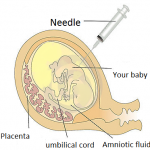CVS or chorionic villus sampling is a diagnostic, prenatal test used to test for chromosomal abnormalities in a fetus between week 10 and week 14 of pregnancy. It is preferred to amniocentesis if you are less than 15 weeks pregnant, but need to check for abnormalities. In CVS, samples of the chorionic villi (the extensions […]
amniotic fluid

Amniocentesis
Amniocentesis, also known as an Amniotic Fluid Test (AFT), is a diagnostic test usually undertaken between week 15 and week 20 of pregnancy, though it can be taken as early as week 11. It is a test in which about 20 mL of your amniotic fluid, which contains fetal tissues, is used to examine the […]
Amniotic Fluid
Amniotic fluid is the clear, yellowish fluid that surrounds your baby in the amniotic sac. It is mainly made up of water, though from about week 10 of your pregnancy your baby will pass low levels of urine into it. Throughout your pregnancy you carry about 800 mL of amniotic fluid in your womb, but […]
Amniotic sac
The amniotic sac, which some people refer to as “the bag of waters”, is the sac of membranes in your womb in which your baby grows. The amniotic sac is made up of two thin, but strong, transparent membranes: the amnion and the chorion. The amnion is the inner membrane which contains your baby and […]

Lanugo
Lanugo is a downy hair which covers your baby between week 14 and week 30 of pregnancy and which should be completely shed by week 38. It is a normal part of all pregnancies and is how your baby keeps warm before he begins to develop fat. The fetus usually ends up drinking the shed […]
Placenta
The placenta is a fetomaternal organ that is formed after fertilisation when the zygote implants into the mother’s uterine lining. It has 2 main components: the fetal placenta, which develops from the zygote, and the maternal placenta, which grows from the mother’s uterine tissue. The placenta grows throughout your pregnancy and at 40 weeks will […]
Possible complications of multiple births
Multiple births are usually considered high-risk pregnancies, but this doesn’t mean your pregnancy will be unenjoyable. However, we have a compiled a list of the possible complications you may expect so that you can speak with your physician about all of the steps you can take to lower your risks and enjoy a healthy pregnancy. […]